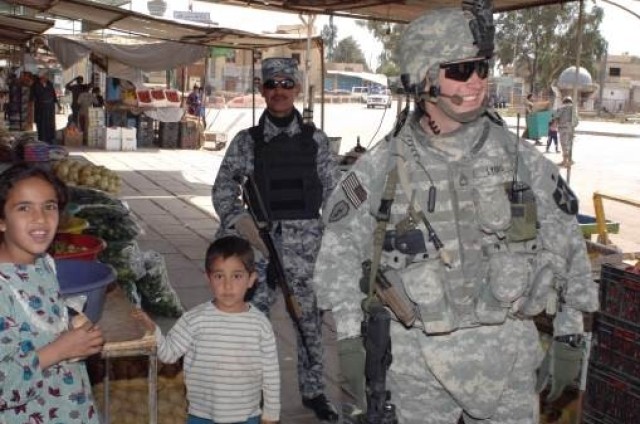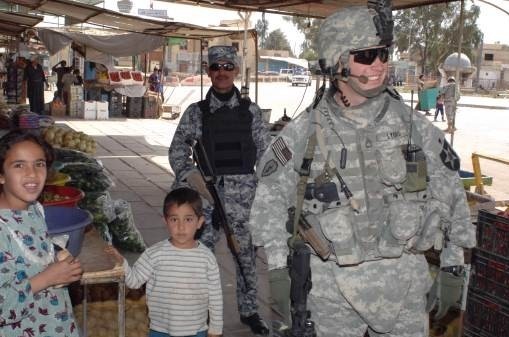WASHINGTON (American Forces Press Service, April 8, 2007) - The success of combat outposts and joint security stations within the Baghdad area have been so successful that there is talk of increasing the number of combined Iraqi and coalition force stations, according to Maj. Gen. William Caldwell IV, Multinational Force Iraq spokesman.
Fifty-four of the 75 outposts and stations are operating in the capital, and the number could rise to 102, Caldwell said today during a combined press briefing in Baghdad with Iraqi Army Brig. Gen Qassim Atta, spokesman for the Baghdad Security Plan.
"Together we are making progress but it's going to take time. I can see it and I can feel it on the streets," Caldwell said.
The dynamics within the capital have changed since the Baghdad Security Plan began Feb. 13. The plan called Fardh al-Qanoon, an Iraqi phrase that means "Enforcing the Law," includes initiatives to split Baghdad into 10 districts and create joint security stations in the capital city.
"There are more Iraqi security forces along with coalition forces out on the streets who are living out there now. They have proven very successful in providing much greater security," Caldwell said.
Caldwell quantified the statement by adding there's been a 26 percent decline in the number of murders and executions in Baghdad between the month of February and March, and a 60 percent reduction during the last week of March and the first week of April. Caldwell cautioned that it is not yet a trend.
"We're very encouraged by that positive sign but it does not mean we've achieved an end state yet. We still have a long way to go and that has to be sustained over a long period of time to really change the dynamics," he said
Caldwell made it clear the last of five brigades scheduled to arrive for operation Fardh al-Qanoon won't be in place until June.
"We're still at the beginning of this plan," he added. With the security plan placing Iraqi and coalition forces in the neighborhoods, it means they are more accessible to citizens and that has brought another success, he said.
"We're working toward building contact with the people and that is going to lead to confidence building," Caldwell said. "The amount of tips that have started to come in from Iraqi citizens has gone up exponentially over the past couple of weeks because the people are starting to develop the trust and confidence in knowing that the security forces will respond to them when they call."
Some of the security stations have set up phone numbers so calls can be taken directly at the station and forces can react more quickly, he added.
In addition to engaging the citizens of Iraq with local security forces, a free press is also critical to the country, Caldwell said. A recently opened radio and television station in the volatile Diyala province northeast of Baghdad means citizens can be informed.
"The opening of the radio and television station in Diyala was a major step forward," Caldwell said. "There's now the ability for the Iraqi press to talk with and engage with the people up there. That's another important aspect because ultimately the solution for anything here is not just the military, it only sets the conditions to allow for a political solution."
Caldwell also took a moment to thank the press for their contributions.
"I appreciate the risks that you take and the sacrifices you make on a daily basis," he told the reporters at the briefing. "A free press is absolutely essential if we're going to keep the Iraqi people informed as to what's going on. Thank you for your service to your country and what you do for your people."


Social Sharing